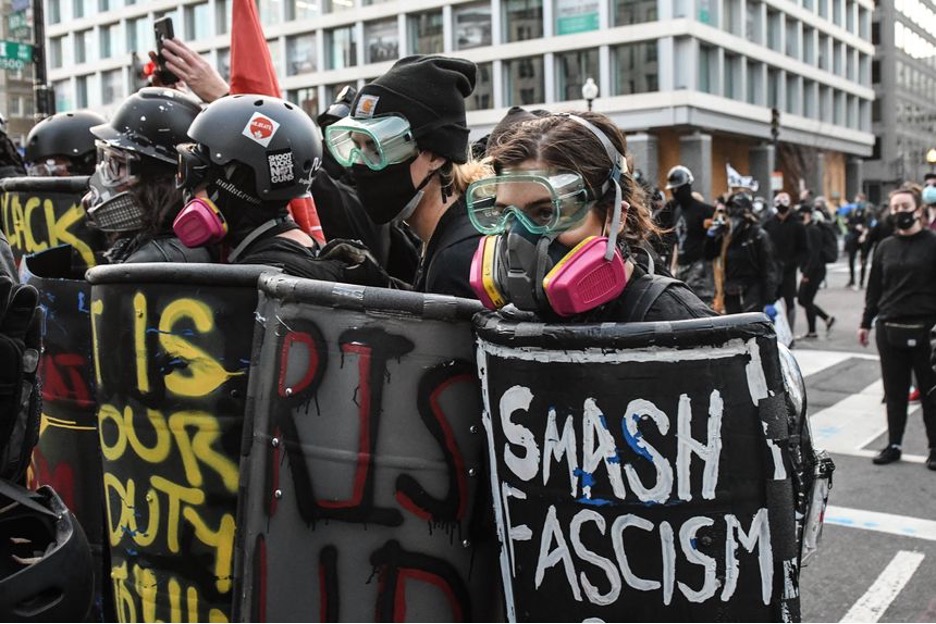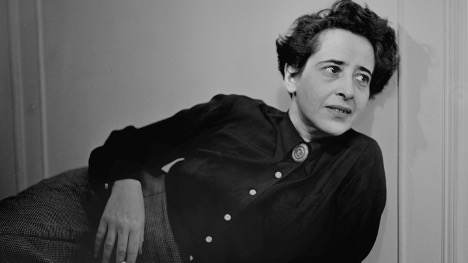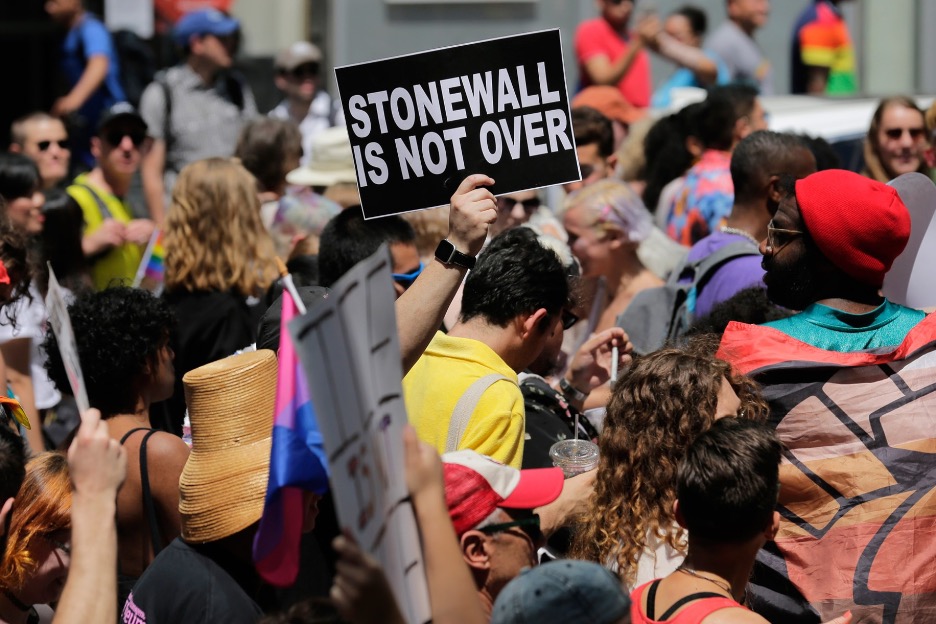“A democracy is two wolves and a lamb voting on what to have for lunch.”
Benjamin Franklin
I don’t tend to look for a lurch towards authoritarianism. It’s not that I’m jaded, but comfortably ensconced in my own bourgeoise, queer life. It was only last summer in fact, before the end of the Trump Administration, when my niece pointed out to me the official GOP stance on gay marriage, which does not “accept the Supreme Court’s redefinition of marriage.” Republicans though, the liberal in me would smugly think, were not a monolith. Besides, they increasingly support gay marriage. And perhaps the basis of Little Nas X’s pop-culture success is the mainstreaming of queer sanctioning his wonderfully and heartingly out, “pop-queer” persona.
I come to “fascist in America” not as some catchall, particularly for conservatives I might disagree with, but more from the perspective of weariness. Personal experience with anti-gay prejudice has sensitized me to the threat posed by anti-gay political movements. Which is to say that conservative political movements in particular, remind me that the queer part of me remains a mainstream threat. As noted by authors Ariel Malka, Yphtach Lelkes, Bert Baker, and Eliyahu Spivack in “Who is open to authoritarian governance within western democracies,” :
Westerners with a broad culturally-conservative worldview — encompassing traditional sexual morality, religiosity, traditional gender roles, and a resistance to multicultural diversity — are associated with a lower commitment to democracy and higher amenability to authoritarian alternatives.
Similarly, Jews (well, there are Jews who are queer), as Hannah Arendt describes in her famous New Yorker essay on the 1963 Adolf Eichmann trial in Jerusalem — encounter a seemingly “eternal and ubiquitous nature of antisemitism”. While my social class affords me a rather gay-accepting social circle, I don’t have to go far to experience anti-gay hostility. When introducing my husband (our marriage is a democratic success story) in a novel social setting — unlike heterosexual couples, I can feel an internal pull to monitor whether I introduce him as such to avoid a micro-aggression. Admittedly, I can’t really hide that we are a couple and so I’ll sometimes experience hostility anyway.
Right-wing or fascist political movements have historically terrorized (or worse) the liberties of Jews and people like me. In the case of the threatening queer, political menace can lie just beneath the surface. Scholars Travis Ray and Michele Parkhill in their 2020 study found gay men threaten heterosexual men’s status at the institutional and individual level where the social order of heterosexuality is dominant. For Gust Yep, author of The Violence of Heteronormativity, the homosexual remains the encroaching, unhealthy other that always stands in contrast to “healthy” and therefore normal, heterosexuality. Gay men’s sexual behavior (especially it seems, for straight men) according to Ray and Parkhill’s research, can elicit disgust, which mitigates perceived threats as an adaptive response, because it violates heteronormativity. Disgust, as an emotion within this heteronormative social order, say the authors, can produce antigay attitudes and hostility towards perceived outgroup members—particularly gay men.
A fascist, if I use the term narrowly and out of pure self-interest, is anyone who would use their position of power to take away my freedoms, because I am queer and not for anything criminal that I might have done. This definition is much like how fascists Arendt wrote, systematically undermined the freedom of Jews in Nazi Germany. Sexuality and religious faith are different of course, but political movements that target the harassment or elimination of outgroup members (people like me) for no good reason are what I’ll call fascistic. Trumpism as fascistic it seems to me, is a reasonable definition out of its impulse to enforce traditional sexual morality and gender roles and use forcible suppression towards those ends. But this is admittedly difficult to prove, in its early stages especially, and in particular for members of an outgroup. To throw such words around is to risk hyperbole in well, heteronormative social orders.
I Am an Antifascist
From this perspective — yet another elite, left-leaning queer writing about Trump fascism can easily turn into yet another partisan rant. It has led in fact, to a counter-discourse of moral equivalency on the right, now fully engaged in a systematic critique of institutional structures of its own. The Right pointing erroneously to power-consolidating impulses on the left, like ANTIFA for instance, beleaguer the political dangers of fascism; which, according to Roger Griffin, author of “The Nature of Fascism”, illustrates its subtle nature and the absence of a consensus definition of the term.
In an email, Human Rights historian Mark Bray told me that “while there is a difference in opinion as to whether Trumpism is straightforwardly fascism, fascistic or fascist adjacent, I would say antifascists certainly see it as in that neighborhood.” From the perspective of a more or less mainstream queer antipathy, if Trumpism continued to gain political momentum, it would mean trouble for me. And political movements that aim to purify and therefore produce a cathartic national rebirth says Griffin, have historical appeal across the social classes. “Informant” Trumpian queers apparently, are not immune to supporting some of the fascistic political mechanisms “necessary” to purify America either. Through their own self-abnegation of course, they further legitimize and fuel a movement that threatens LGBTQ existence writ large. A political movement that operates, repeating myself, within heteronormative social orders.
Conversely, antifascists, mostly unconsolidated “radicals and revolutionaries” Bray contends, are “pro-LGBTQ and against homophobia.” I may not love some of their tactics, but I choose the politics that support my existence.
The American Fascist
Fascism, for Robert Griffin, is a revolutionary form of nationalism which sets out to be a political, social, and ethical revolution. Using Griffin’s definition, Trump “represents a movement born out of anxiety, frustration, and despair in the contemporary state of human affairs.” Ray Kiely, author of “Locating Trump: Paleoconservativism, Neoliberalism, and Anti-globalization” describes a free market fundamentalism as the genesis of an American authoritarianism. Pristine, free markets are possible if rugged individual “producers” of economic good are allowed to prevail over weak “parasites”— such as welfare recipients, immigrants, and “socialists” as emblematic of civilizational decline. Trump’s populist nationalism Griffin observes, contains the promise of pristine free markets where MAGA is transfigured into the visionary sense of an imminent new world. This in turn, he says, mirrors fascism’s raw materials: forces of militarism, racism, charismatic leadership, and fears that the nation as a whole is being undermined by the forces of decadence.
Apparently, Republican voters — not Republican leaders — wanted Trump (and so far, still do). Matthew MacWilliams, author of “Authoritarian voters and the rise of Donald Trump”, argues a preexisting American authoritarianism:
Ignited Trump’s rise in part, because voters resonated with his unvarnished, us- versus- them rhetoric. Authoritarian-driven partisan polarization provided the fuel for Trump’s campaign, with Trump messaging and ruthless manner igniting that fuel. With Party insiders in the 2016 Republican presidential contest failing to anoint a standard bearer — Donald Trump anathema to party leaders, was chosen by America’s authoritarian voters as their candidate of choice.
If Trumpism represents the existence of a contemporaneous, “everyday” fascism in America, this feels much like when some punks yelled “hey, faggot” from a passing car at my husband and I holding hands in normally, “gay safe” San Francisco. A similar, chilling attack on queers was soon evident with the Trump administration’s own Justice Department seeking to block — in full light of expanding acceptance of marriage equality and improving public attitudes towards the LGBTQ community — landmark non-discrimination workplace protections. As described by Arendt, the obsequious Trumpian queers who didn’t push back on these attacks were the equivalent of the Jewish leaders who negotiated with the Nazi regime during the early stages of the Third Reich. A few complicit queer groups that legitimize fascism are, Arendt might say, “dangerously underestimating” their nefarious intentions.
The Expunge-able Queer, the ‘Depth’ of Democracy and the ‘Shallowness’ of Evil
David Johnson, author of “The Lavender Scare; The Cold War persecution of gays and lesbians in the Federal Government” describes a historical, orthodox view of queers in America as weak and immoral. Queers have historically been associated with fears of an infiltrating communism according to Johnson, and this is reflected in Trump behavior early on. Moving to contain the “threat”— perhaps because of advancing LGBTQ rights(?) — the administration echos former American Senator Joseph McCarthy’s efforts to uphold “stable, monogamous, heterosexual marriages as a key weapon in the arsenal against degeneracy and Communist subversion.” An assault on LGBTQ rights, similar to so-called Nuremberg Laws after the Nazis took power in 1933, began a legal attack on— among other depreciated groups—Jews.
Sure, Johnson wrote about the mainstream threat of the homosexual in a 1950’s social order. Times are certainly different now. While LGBTQ people enjoy greater protections in 2021, the right wing, in America in particular, continues to perceive queers as a threat to traditional social norms and moral values. Predicting a Trump administration attack of LGBTQ, social research done by Jarret Crawford found right-wing authoritarian political views were a robust predictor of prejudice against queers and counterintuitive to increasingly pro-gay societal attitudes.
This is illustrated in the Trump administration’s religious freedom rhetoric. Embedded in the Religious Liberty Accommodations Act — also known as the Protecting Freedom of Conscience from Government Discrimination Act — this rhetoric states that God created us to be free and government can’t infringe upon that right. As coding for bona fide hostility towards queers, it mirrors fascist discourse by consolidating right-wing political hostility towards LGBTQ.
In Mattathias Schwartz’s report on “The ‘Religious Freedom’ Agenda,” without being partial to a certain religion, and thus running afoul of the Constitution’s establishment clause, this rhetoric around the origin of “natural” and inalienable rights can be located in a “creator” and thus natural rights are best protected when protected for all, and not just particular [LGBTQ] identity groups. In the 2016 report briefing citing the backlash to same sex marriage in 2015 before the United States Commission on Civil Rights, Chairman Martin Castro said religious freedom “stands for nothing except hypocrisy so long as they remain code words for homophobia.” Trump rhetoric Arendt might say, is a very powerful will to abolish [democratic] consciousness.
Thus, Trump religious freedom rhetoric as Arendt might say, starts the process of corrupting the normal basis of moral law and exploding legal categories. Defying equal rights as part and parcel of democracy — it provided further recruitment of normal and purifying, anti-queer political sentiments. The Nazis, as noted by Arendt, succeeded in turning the legal order on its head, “making the wrong and malevolent the foundation of a new righteousness.” One she says that begins the process of nullifying the demanding nature of a Democracy. As noted by Martin Castro, sneaking their way back into political and constitutional discourse, religious freedom appeals are an “effort to undermine the rights of some Americans” that were “motivated by [anti-LGBTQ] animus.”
Among a democratic voting system explained Arendt, respect for the rule of law is the “depth” of democracy—basic respect for human rights that is paired with a multi-party, political system built on political tolerance. One never intended, Castro argued, to give “religious dominion veto power over the civil rights and civil liberties of others.”
In her report on Adolf Eichmann, Arendt said “evil”, in contrast to good, is “shallow”. Good has depth, Arendt said, because it is “radical” whereas evil is “banal” and is never radical — it can only be extreme. Trump’s rhetoric around the conventional harassment of queers can leave the complex burdens of civil liberties unexamined. It courts a fascistic trajectory through a call for traditional values animated by anti-queer bias. Evil can be a “feeble” status quo says Arendt— “a failure to think” possessing neither depth nor imagination, and perhaps to its mainstream straight audiences, no “outwardly demonic dimensions.” Inane and discounted as the next outrage in left, hetero-centric media circles, Trump’s rhetoric as (social) media juggernaut along with Republican leadership beholden to its authoritarian-leaning constituents, forms the political basis of a fascist foothold in America.
This calls to mind a furtive yet mainstream tolerance of antisemitism in 1930’s Germany. The Nuremberg Law, as a product of antisemitism, along with surging Nazi power, began the process of denying Jews multiple positions in society. It was evil wrote Arendt, operating in a closed system run by pathological gangsters — and in the contemporary sense, silent Trump supporters.
Given my own discursive experiences of indiscriminate anti-gay hostility, “political neutrality” towards the Trump onslaught is more the attitudinal terrain of privileged heterosexuals. It’s easier for those who have never registered a serial and historical anti-queer animus, to view a Trump supporter as non- threatening. Which doesn’t account for unsettlingly, Trumpian queers who for Arendt live like Jews who, complicitous with Nazis, lived mendaciously in “a fool’s paradise,” by cooperating with “murderers in their midst.” Similar, Trump queer’s fealty to an anti-queer politics belies its substantive aim to undermine them.
Fascists in Our Midst
What about the distracted Trump supporters in my own family as fascists bent on eradicating me? This seems wholly preposterous. Especially since, democratic institutions held — albeit uneasily— and like I said before, I had-it-made. Straight, Trump-supporting family members gaslighting me, when I object to their politics, would seem a natural progression. They clearly see my comfortable existence and still-holding political institutions. Importantly, they don’t have my experience with indiscriminate, existential threats from passing cars. But they wouldn’t take the time to acknowledge them either.
As noted already by Griffin, certain not-queer members of my own family are not immune to the powerful American, libertarian myth. The significance of discounting Trumpism for its shock value he cautions, belies the presence of fascism as a permanent feature of modern political culture. Owing to personal experience and faithful to the vigilance of Arendt, taking fascism seriously means calling it out in its ordinariness not just in the street, but in every interaction.
Risking being overly indolent, the threat of fascism could exist uncomfortably, in the security of my own family and its abstruse connection to an anti-queer political movement. An overt, concerted attack on queers, as exhibited by the former Trump administration, could be overshadowed by enthralled, but straight, Trump-supporting family members who don’t experience anti-gay hostility. The trouble with a fascist in the family, Arendt might explain, is precisely that so many are like him, and that the many were neither perverted nor sadistic. That they were, and still are, terribly and terrifyingly normal, she said. A fascist, as an often- abused term, could be someone with which I break bread.
MAGA, as Griffin might say, is a call for pure action which is never unattractive, and to a Trump supporting family member— a constantly, self-renewing source of temptation coupled in this case, with a faint, but still-smoldering ember of a culturally pervasive, straight- chauvinism. The part that could more easily ignore my tenuous hold on political freedom.
The banality of evil, precisely because it coexists within the normalcy of family as summarized by Arendt, explodes our ordinary conceptions of it. The straight, Trump-supporting family member that “supports” me, also tacitly undergirds the political apparatus that seeks to annihilate me.
Trump supporters in the family are oblivious to the violent potential of the abjectly anti-LGBTQ rancor dangerously emanating from the Trump administration. Incognizant of the instability of LGBTQ rights, and by default, don’t understand why I might object to their politics. The Trump supporter in the family put simply, is tacit acquiescence in that moment to LGBTQ predations that score dangerous political points against me.
Resisting the initial (inane) stages of fascism, emerging from battered-but-still-functioning democratic institutions, Arendt speculated, would still elicit prized individual freedom-loving notions of partisan neutrality. Respect for differences or “who am I to judge?” she deliberated — not resisting evil when and where we see it, thereby letting it gain a foothold like a “fungus on the face of the earth”— can also mean “we have already lost.” As pointed out by Arendt, however, it wasn’t an individual or even the Nazi regime alone on trial in that Jerusalem court — but an opaque antisemitism throughout history. Antisemitism would be dangerous for Jews much like a prevailing heterosexism is for LGBTQ communities. The queer part of me as noted by Bray, “will not agree to disagree” with your vote for Trump. I would not wish to be further destabilized than I am already.
But I would push back on its real danger amidst conventional anti-queer bias and in the recesses of still-holding democratic institutions. Resisting a fascistic political movement as queer and targeted for persecution by that very movement, is a predictably ironic, yet burdensome, task. Such resistance faces a dominant political group who have never faced unlooked-for, anti-queer enmity. I, the bourgeoise queer, would appear irrational and antagonistic. Objecting would result in prevaricating from straight people, especially because they wouldn’t as easily notice its emerging evil in the dull-normal.

James Robert Brooks







